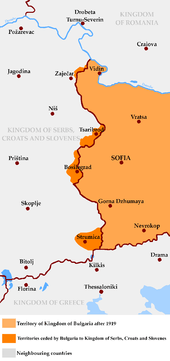Western Outlands

.png)
The Western (Bulgarian) Outlands (Bulgarian: Западни (български) покрайнини, transliterated: Zapadni (Balgarski) pokraynini) is a term used by Bulgarians to describe several territorially separate regions located in southeastern Serbia.
The territories in question were ceded by Bulgaria to the Kingdom of the Serbs, Croats and Slovenes in 1920 as a result of the Treaty of Neuilly,[1] following the First World War. According to the Yugoslav census of 1991, two of the largest cities in the Western Outlands, Bosilegrad and Dimitrovgrad, were populated primarily by Bulgarians.
Internal Western Outland Revolutionary Organization
The Internal Western Outland Revolutionary Organization (Bulgarian: Вътрешна западнопокрайска революционна организация, Vatreshna zapadnopokrayska revolyutsionna organizatsiya), IWORO, was a Bulgarian separatist organization active in the Western Outlands between 1921 and 1941 in the Kingdom of Serbs, Croats and Slovenes (until 1929), and then its successor, the Kingdom of Yugoslavia.[2]
The organization was established in 1921 on the basis of several detachments created straight after the cession of the Western Outlands to Serbia in 1920. The IWORO initially concentrated on propaganda and delivery of Bulgarian literature. The period of armed conflict started in 1922 and the organisation carried out numerous assaults on the Tzaribrod–Belgrade railway, on bridges, Yugoslav garrisons and barracks until 1941 when the region was occupied by Bulgarian troops.
Unlike the other three Bulgarian revolutionary organizations active in the interwar period — the Internal Macedonian Revolutionary Organisation in Macedonia, the Internal Thracian Revolutionary Organisation in Thrace and the Internal Dobrujan Revolutionary Organization in Dobruja — IWORO did not put up the tactical slogan demanding autonomy for the region but had an open separatist agenda; itfought “for the liberation of the Western Outlands and their restoration to Bulgaria”.
Controversy
The Serbian state deems the term controversial, referring to parts of a neighboring country's territory as "western outlands" can imply territorial claims, as in the example of Germany regarding Alsace in France.
For this reason, the term has not been used by Belgrade in contacts with Sofia since 1948. It was mentioned once, in the 1947 Bled Agreement by Josip Broz Tito and Georgi Dimitrov. This was in the period of Joseph Stalin's push for a Communist super-state in the Balkans, the Balkan Federative Republic, which was to include Yugoslavia, Albania and Bulgaria. The BFR idea was abandoned with the Informbiro Resolution of 1948, when the split between Tito and Stalin occurred. Despite not being used internationally (until the 1990s when it was revived), it is very widely used in internal social and political communication in Bulgaria.
See also
- Bosilegrad
- Dimitrovgrad (Serbia)
- Bulgarians in Serbia
- Bulgaria during World War I
- Serbia during World War I
References
- ↑ Treaty of Peace Between the Allied and Associated Powers and Bulgaria, and Protocol and Declaration signed at Neuilly-sur-Seine, 27 November 1919
- ↑ Manchev, Krŭstyo (1999). History of the Balkan peoples (XIX-XX century). Academic publishing house "Acad. Marin Drinov". p. 185.